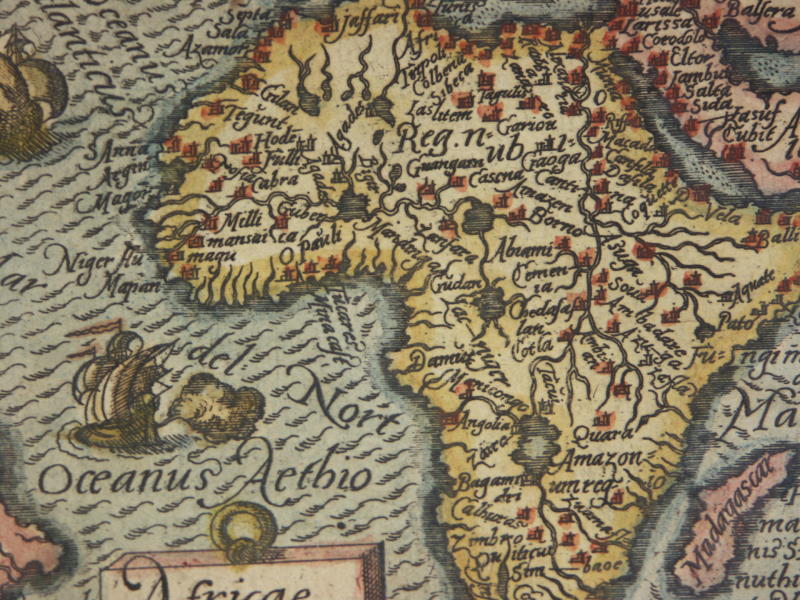The default unit of analysis for many economists when dealing with national economics is the state. Yet, in economics textbooks ‘the state’ is often assumed to be a neutral actor exogenous to economic processes. It is assumed to be the same – in essence – everywhere. This conception is based on a Eurocentric view of the state, which assumes all states are ahistorical Westphalian nation states based on Enlightenment principles. However, states are not neutral, but deeply shaped by historical processes. Analyses of ‘states’ in economics – country analyses, country data, evaluations of so-called ‘macroeconomic fundamentals’ – must be rethought by taking the complexities of the state in Africa into account in their conceptualisations, analyses and policy proposals. In this piece, I unpack how the African state evolved as a colonial project and the implications of it being mischaracterized as neutral state.
A state like no other
The state in Africa has been mischaracterized as a neutral institution devoid of a problematic history which affects its present. In its simplest terms, the state is an institution of governing, i.e., a political organization whose main aim is to establish and maintain security, law and order within its geographic jurisdiction. In economics, the state is discussed and perceived as a one size-fit-all institution, one that is and must be similar in Europe, Asia, Africa, and the Americas. The African state, in particular, has been presented as if it is similar to other states, especially in Europe and the United States of America to which it must aspire.
Moreover, the African has been evaluated and judged on the basis of other perceived progressive states, especially those on the western hemisphere. That states are the same is both untrue, misleading, and ahistorical. African states are very different from other states as they are products of conquest, colonialism, genocides, epistemicides and slavery. It was created to support these processes and it still dispenses them mainly through violence. Those who colonised African countries did so not only to access markets and raw materials, but to displace epistemologies and decentre the colonized; and in the process they centered the colonising countries as the centre of knowledge production and essence of humanity. This is the origin of the superiority of liberal economics as the dominant way of understanding and doing economics in Africa.
Historicizing the state in Africa
The state in Africa is not an African state, but a colonial creation, one created for colonial purposes which it still pursues and fulfils today. The modern version of the state which still exists in Africa was founded in Europe, not in 1648 at the signing of the Treaty of Westphalia, but on 2 January 1492 at the conclusion of the Reconquista (Mamdani 2020). The Reconquista was the series of wars, epistemicides, and genocides perpetrated on the Iberian Peninsula predominantly on Moslems, Africans Jews, and women by the Spanish Crown. Started in 781, it concluded with fall of the Nasrid kingdom of Granada in 1492. The bifurcated results of the Reconquista which created the core and the periphery have remained the main way of organizing and recognizing states in international relations. This version of the state was violently imposed on Africa as part of the colonial processes together with its problems which it had failed to solve in Europe, which was mainly related to solving the problem of minorities.
The state, or should I say the Western model of the state, has been the only acceptable way of managing and organizing political life in this world. This ideal of state was further cemented at the Treaty of Westphalia in 1648. The Treaty of Westphalia must be understood not as the birth of the modern state, but as a process that cemented the state through the norm of what became known as state sovereignty. However, in contrast, the significance of the Treaty of Westphalia for Africa is that it is the moment in history when sovereignty was usurped from the nation and appropriated by the colonial state. This led to formal colonization of Africa and the Global South which had started to happen a with the arrival of 500 Englishmen on Roanoke Island in 1584 thereby establishing the first English overseas colony in the Americas. This was a direct response by Protestant England to weaken Catholic Spain with whom they had been fighting for decades as part of the Reconquista. This formal colonization of the Global South in 1648 is marked by the occupation of Bahamas followed rapidly by the establishment of St Kitts and Nevis in 1660. The irony of the signing of the Treaty of Westphalia and the concomitant recognition of state sovereignty among Europeans is that while Europeans agreed never to fight each other again, they were to congregate, ironically in Berlin, in Germany, this time to agree to go and deny Africans their sovereignty by portioning and subsequently colonializing Africa.
Colonization of land, minds, and epistemology
The colonization process was therefore not simply the occupation of the land, but it was more importantly, the occupation of the African mind, the displacement of African knowledge and belief systems and replacing them with western ones. Once its epistemology and knowledge systems were replaced, Africa and Africans have been standing on shaky grounds (Nhemachena, Kangira, and Chiripanhura 2021). Shaky in every aspect of life: epistemologically, legally, religiously, ideologically, economically, politically, morally, etcetera. Nothing accounts for the continuous resilience of the colonial state in (post)colonial Africa more than the fact that the nationalists inherited it and continued to administer it albeit with some cosmetic non-structural changes.
This explains why what is termed as African economics today, for example, is basically western liberal economics and the same can be argued about the African legal systems which are basically Roman-Dutch law and English common law. Stated differently, Africans as a people live at least a double epistemology; a colonial western one and an indigenous African one. It is because of these shacky grounds that the state in Africa has been variously described as in states in perpetual infancy, failed states etc. If African states are still infant states; who are the parents responsible for it? If African states are failed states; who failed them and who won?
What is the colonial state in Africa?
Prior to European colonization, Africa had various forms of the state. These were all displaced and replaced with the European model of the state, which is characterized by four attributes: (1) paradigm of war, (2) paradigm of difference, (3) survival of the fittest and (4) will to power. The paradigm of war is characterised by logics of racial profiling, classification of human beings as inferior or superior, and hierarchization of human beings. Together with the paradigm of differences which is anchored on creating, amplifying and instrumentalising human differences, the paradigm of war enabled the denial of the humanity of black people, their enslavement, commodification and commercialisation, conquest, subjugation, colonisation, dispossession, exploitation (Ndlovu-Gatsheni 2015b). As the state in Africa was born out of war, it continues to be a very violent institution. Created to manage and subjugate the different and colonizable ‘other’, the state retained its purpose when African states gained political independence.
I argue that by fighting for the control of the state, African nationalists were misguided as they were fighting for the control of a problematic institution, one which would continue to dispense its original purpose regardless of who was in charge. This explains why different forms of the state and statecraft continue to fail dismally in (post)colonial Africa. Secession failed in Eritrea and South Sudan, the monarchy is failing in eSwatini and Morocco, ethnic federalism is failing dismally in Ethiopia and so is tribal federalism in Nigeria. Long incumbency failed in Zimbabwe, Angola, Cameroon and Guinea while the rainbow nation of South Africa is witnessing a rise in unemployment, poverty and inequality never seen before. The passing of power from father to son failed in Togo with the Ayademas who ruled the country five times, for 48 years. Africa has had seven countries being ruled by a father and son (and one brother) combination. These are Botswana (Khamas), Kenya (Kenyattas), the Democratic Republic of the Congo (DRC) (Kabilas), Gabon (Bongos), Togo (Ayademas), Mauritius (Ramgoolams), and Malawi (Mutharika). The colonial state succeeds so spectacularly from the perspective of the coloniser because it is founded on and efficaciously employs the paradigms of war and difference, and thrives on the doctrines survival of the fittest and the will to power.
Elsewhere in Somalia, clan-based statecraft has resulted in numerous clashes with many splinter conflicts such the intergenerational conflict (al Shabab), central government versus regional governments, British Somalia versus Italian Somalia versus French Somalia etc. Surely, the colonial state is the problem in Africa.
The resilience of the colonial state in Africa
During the various anti-colonial struggles, the nationalists were fighting for the control of the state, which was a toxic and oppressive institution from the beginning. Anticolonial efforts at worldmaking sought to establish a world of what’s Getachew termed “nondomination” (Getachew 2019). Thus, worldmaking is a more viable option because national independence in a hierarchical world order is ineffective, a concept referred to as coloniality (the continued asymmetrical power relations between the (former) colonisers and the (former) colonised long after the end of official colonialism).
When in possession of the state, the African nationalists were faced with three options at independence: (1) to completely abandon this colonial creation and start something new, (2) go back to the pre-colonial forms of the state forms and continue with those albeit with some modification or (3) continue with the colonial form of the state hoping to change it as they go (Nzongola-Ntalaja 1985). Most (post)colonial nationalist governments in Africa opted for the third option, needless to mention that thus far, the many problems in Africa are symptomatic of the failure of the nationalist project to turn the colonial state into a national asset. The nationalists struggled to counterbalance globality, to borrow from Getachew.
Implications for institutions beyond the state
Once the colonial model of the state was imposed on Africa and other colonies, the following institutions were then imported and remain effective: (1) the capitalist world economy, (2) the post-1945 United Nations sovereignty state system, (3) Euro-North American-centric world culture and European languages, (4) a Euro-North American-centric moral order dominated by Christian thought and (5) the Euro North America legal system dominated by Roman Dutch law (Ndlovu-Gatsheni 2015a:485–86).
There are numerous reasons why the state is not working in Africa. The state is comprised of many nations most of which are found in different states. In resisting and contesting colonial borders, many nations which find themselves in different states have asserted that, ‘the border found us here’ (Benyera 2019). This makes both state making and nation building very complicated. The state also remained structurally, epistemically and operationally western-centric. Key state institutions such as the judiciary remain structurally unchanged especially its legal logic and jurisprudence.
Economically, the (post) colonial States remained extractive, extroverted and most importantly anti-black. Instead of being a vehicle for redressing historical harms such as slave trade, colonialism, and apartheid, the state, on the contrary predominantly perpetuates the status quo. South Africa’s famed constitution contains chapter 25 which is by no mistake but by design the longest in the constitution. It also took the longest time to negotiate. This chapter contains the contentious issue of private property which effectively allowed apartheid beneficiaries and victims to roll over their ill-gotten wealth and poverty respectively into the post-apartheid era. Working in tandem, the state and the constitution managed to validate and exonerate colonial and apartheid crimes, especially the theft of land. The two effectively ensured that the structure of colonial apartheid remained intact in the supposed new democratic dispensation. #
Everisto Benyera is Professor of African Politics at the University of South Africa.
This blog post is a part of the Decolonising Economics blog series.
References
Benyera, Everisto. 2019. “African Borders and the Coloniality of Human Movement.” Pp. 29–45 in African Borders, Conflict, Regional and Continental Integration, edited by I. Moyo and C. C. Nshimbi. London: Routledge.
Getachew, Adom. 2019. Worldmaking after Empire: The Rise and Fall of Self-Determination. Princeton and Oxford: Princeton University Press.
Mamdani, Mahmood. 2020. Neither Settler nor Native the Making and Unmaking of Permanent Minorities. Cambridge and London: The Belknap Press of Harvard University Press.
Ndlovu-Gatsheni, Sabelo. 2015a. “Decoloniality as the Future of Africa.” History Compass 13(10):485–96.
Ndlovu-Gatsheni, Sabelo. 2015b. “The Decolonial Mandela: Embodiment of Peace, Justice, and Humanism.” Journal of Developing Societies 31(3):305–32.
Nhemachena, Artwell, Jairos Kangira, and Bornway Chiripanhura. 2021. “#HumansMustFall Movements and the Future of African Liberation without African Liberation Movements: A Decolonial Introduction.” Pp. 1–48 in From #RhodesMustFall Movements to #HumansMustFall Movements: African Liberation Movements in the Age of the Transhumanist Geographies of Death, edited by A. Nhemachena, J. Kangira, and B. M. Chiripanhura. Bamenda: Langaa RPCIG.
Nzongola-Ntalaja, Georges. 1985. “The National Question and the Question of the Crisis of Instability in Africa.” Alternatives 26:533–63.
Publisher: Source link











